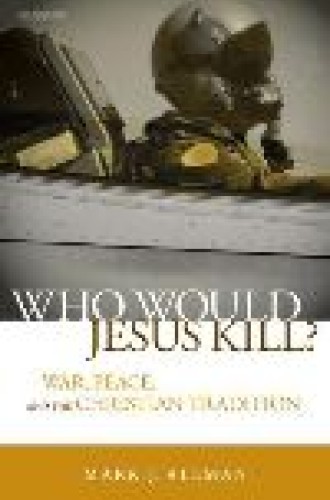Who Would Jesus Kill? War, Peace, and the Christian Tradition
There was once a time when most people assumed that the question of whether to wage war was to be decided by princes and kings, but in a democracy this moral responsibility ultimately rests with all citizens. In Who Would Jesus Kill? Mark J. Allman challenges readers to take this responsibility seriously—to reevaluate their own ethics of war and peace in light of various strands of Christian moral reflection and witness.
Allman teaches at Merrimack College in Massa chusetts. Despite his self-identification as “a contemporary just war theorist with a strong affinity for just peacemaking,” it seems that he is conflicted about his position within the just war tradition and wonders whether he and all Christians should be pacifists rather than just warriors. The fact that he is torn between these two traditions makes Allman a trustworthy, evenhanded guide to both perspectives.
The book is designed to help readers locate themselves on a spectrum from absolute pacifism to advocacy of holy war and to critically examine those positions and every position in between. Although holy war has a place on the menu of choices, thankfully Allman does not hedge on whether it is OK to be a modern-day crusader. He is quite direct on this point: “I see no place for holy war within the Christian faith.”
He explains well why holy war can be so dangerous. Those who fight a holy war believe that their cause has been validated by God and that their enemy is evil and has no legitimate standing or rights. This good-versus-evil dualism can cause crusaders to excuse themselves from the traditional restraints on war.
Allman analyzes speeches by Pat Robertson, Billy and Franklin Graham, and President George W. Bush, highlighting the rhetoric they use that belongs to the tradition of holy war. Unfortunately, Allman does not fully develop this analysis or explain satisfactorily how there can be “no place for holy war in Christianity” while so many prominent Christians remain captive to that way of thinking.
Allman makes a strong case for Christian pacifism, offering a swift historical treatment of its development, along with scriptural and theological arguments in favor of it. He then poses some very concrete challenges. Perhaps his most powerful critique centers on whether there is a political and moral responsibility to protect innocent people when they are threatened (by genocide, for example). This humanitarian intervention scenario pits prohibitions on killing against the Christian obligation to show love of neighbor and to protect innocent life. Allman asks readers to consider whether Christian pacifists have an overdeveloped confidence in human goodness and fail to take sin seriously, or whether pacifists are correct when they claim that Christians face “a choice between being faithful to the command and example of Jesus Christ or succumbing to the worldly desire to be successful, practical, or realistic, a desire that is often premised on fear.”
Allman is at his best when he is explaining the dynamic and evolving nature of the just war tradition. He carefully describes the recent debate about President Bush’s policy of taking preemptive military action, explaining that while the just war tradition has long recognized a country’s right to act against an imminent, immediate threat, it has always regarded preventive action against merely potential or hypothetical threats as unjust.
Allman’s scholarly research has focused on jus post bellum ethics, which addresses issues that arise after active fighting has ceased. For example, cluster bombs, each of which contains hundreds of smaller bomblets, can extend the violence of war because about five percent of the bomblets fail to detonate on impact. Long after the war has ended, these bomblets litter the countryside and can inflict disabling or lethal injuries on unsuspecting civilians, often children. Jus post bellum ethics places responsibility for preventing postwar violence on countries that use these weapons.
The implications of jus post bellum ethics for U.S. policy in Iraq and Afghanistan are profound, but Allman makes only passing reference to the U.S. military’s use of cluster bombs, landmines and depleted uranium shells in those conflicts. Jus post bellum ethics demand that a just cause for entering war be extended to the establishment of a just peace. There must be postwar efforts at reconciliation, and the victors must work with those who suffered defeat to establish political, economic, social and ecological conditions that allow all citizens to flourish. As the U.S. attempts to develop strategies for exit from Iraq and Afghanistan, these criteria should play an important role in policy deliberation. Christians who favor a quick exit from Iraq and Afghanistan will find food for thought in Allman’s treatment of postwar ethics.
The book concludes with a very interesting appendix offering brief but helpful treatments of Jewish and Muslim perspectives on war and peace, including a discussion of the contested meaning of jihad in Islam.
Allman has written a clear, accessible book that will help novice readers navigate the complicated history of Christian thought and practice on war and peace.





